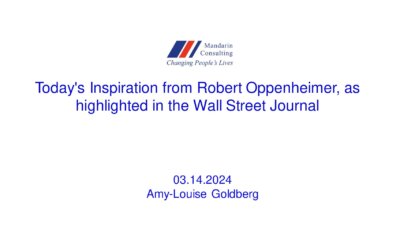14.03.2024 Today’s Inspiration from Robert Oppenheimer, as highlighted in the Wall Street Journal

Dear Students,
How many of you caught the 96th annual Academy Awards presentation this past Sunday? Even without watching the 3+-hour show, you may have heard that Oppenheimer won 7 Oscars, including for Best Picture, Best Director and Best Actor (Cillian Murphy, as Robert Oppenheimer). And, while we’re all likely familiar with Oppenheimer, the “Man Who Built the Bomb,” it may be surprising to hear just how he was able to do so.
|
The theoretical physicist had zero experience as a manager. Yet when the world hung in the balance, he became one of the most effective leaders in history.
www.wsj.com
|
In the article above, Ben Cohen, a veteran WSJ writer, beautifully captures some of the power skills that allowed Oppenheimer, against the odds, to succeed in his mission-critical assignment.
As you’ll see below, these include competencies and personal qualities that candidates like you will need not only in the short term, but in the longer-term, as well, if you aspire to global leadership roles.
Listed in the order they appear within this piece:
-
Ability to leverage analytical skills to assess talent
-
Leadership skills to build a team
-
Perseverance to “do whatever it took” to attract the best scientists
-
Dedication to and flexibility in “going above and beyond” to influence the experts Oppenheimer believed in
-
“As patient as he was relentless,” demonstrating creativity, endurance and resilience when seeking to coax a particular recruit
-
Taking the initiative to conduct research, to help Oppenheimer “sell” the remote location where he was working to prospective talent
-
Knowledge of “how to get the best work out of his scientists,” exhibiting emotional intelligence and understanding of how to motivate others
-
Communication skills, to “break through to almost anyone and figure out how to connect in even the most unlikely circumstances”
-
Ability to amass experts “with different perspectives and bring them to a consensus,” demonstrating ability to listen carefully, think critically and persuade
-
Capacity to “summarize salient points that everyone had been making and point the way forward,” illustrating his deftly crafting a common vision and aligning others behind a unified mission
-
Demonstrating self-awareness, in choosing to act as “an authoritarian who didn’t believe in giving orders,” highlighting humility (along with knowledge that the carrot is more powerful than the stick)
-
A talent for “gently nudging scientists in the right direction,” demonstrating understanding of how to engage others; he was “intense but informal, commanding respect without demanding it”
-
Speaking quietly, deliberately using “reverse psychology” to captivate others
-
Strong commercial awareness, exhibited through “his broad knowledge and breadth of interests, allowing him to make connections across disciplines”
-
Showing curiosity and inquisitiveness about a range of topics, along with a continuous learning mindset, rather than simply focusing on one area, which paid off in innovation: “Very often a scientist [in a weekly colloquium] would intrigue a scientist in a completely different branch [of science]…and he would come up with unexpected solutions”
-
Ability to “explain everything he knew without condescending,” conveying respect, ability to adapt and adjust his style to the needs of individuals, through “speaking in plain English”
-
Refusal to create hierarchy, even “objecting to making a basic organizational chart,” highlighting a desire for equality and inclusiveness, to make each contributor feel important
-
Insistence on collaboration, exhibiting not only his own leadership but also a commitment to teamwork (and the challenges of working with those from diverse backgrounds, skill levels and interests); he “understood the value of gathering people from different parts of a project in the same place, encouraging them to discuss their work and combine ideas”
-
Empathy and sensitivity, recognizing that team meetings, where all could share their ideas, “improved morale,” and communicated that “everyone had a role to play”
All told, Cohen writes, Oppenheimer, despite his “complete inexperience running complex organizations” and “his knack for breaking every piece of equipment he walked past…won the loyalty” of [his team], as “they could see that he was protecting them, allowing them to collaborate and talk freely, which was necessary to the success of the project.”
—
While none of you, as ambitious international students, will likely become involved with a project of this scope in the immediate future, our coaches hope that you can nonetheless use this inspirational piece as a springboard for demonstrating the practical benefits of the many skills and traits that Oppenheimer exhibited, and which you, too can develop in our program.
